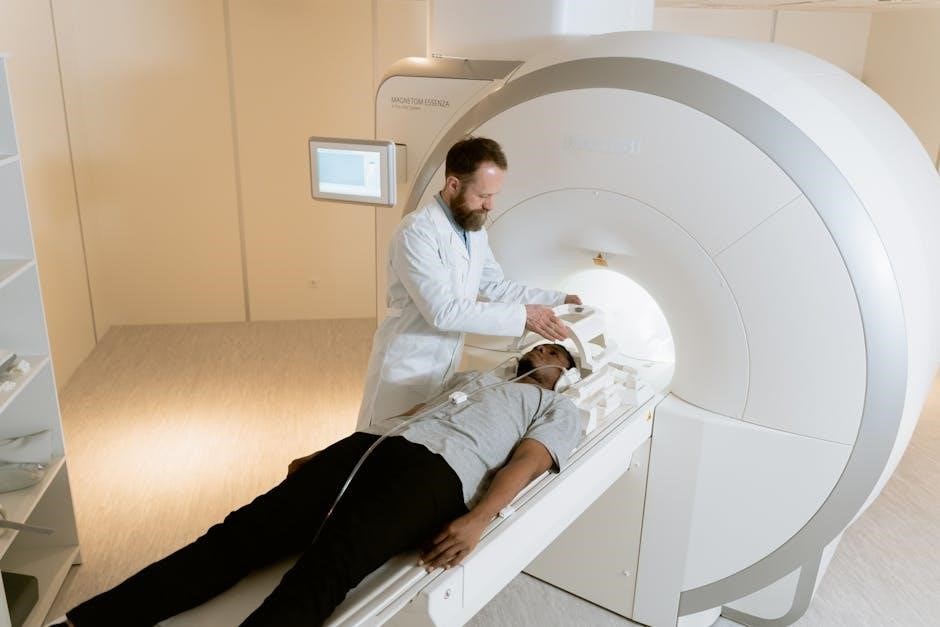
brief cognitive assessment tool pdf
Brief Cognitive Assessment Tool (BCAT): Overview
The Brief Cognitive Assessment Tool (BCAT) is a new screening measure designed to identify cognitive dysfunction․ BCAT emphasizes contextual memory, executive functions, and attentional capacity․ It also helps predict instrumental activities of daily living․

Brief Cognitive Assessment Tool (BCAT): Overview
Definition and Purpose of BCAT
The Brief Cognitive Assessment Tool (BCAT) is a concise instrument created to efficiently screen for cognitive impairment․ It focuses on key cognitive domains such as memory, executive functions, and attention․ Unlike some other tools, BCAT places a significant emphasis on contextual memory, evaluating how individuals recall information within a specific situation․ The BCAT aims to differentiate levels of cognitive functioning, helping clinicians to identify individuals who may benefit from further neuropsychological evaluation․
The primary purpose of the BCAT is to provide a rapid and reliable method for assessing cognitive abilities in various settings, including assisted living facilities and primary care․ By identifying cognitive deficits early, interventions can be implemented to support individuals and manage their conditions effectively․ The BCAT also helps predict an individual’s ability to perform daily living activities․
Brief Cognitive Assessment Tool (BCAT): Overview
Target Population and Use Cases for BCAT
The BCAT is primarily designed for use with older adults, particularly those referred for neuropsychological evaluation or residing in assisted living facilities․ Its brevity and ease of administration make it suitable for screening individuals who may be experiencing cognitive decline or who are at risk for developing dementia․ It can be used in various settings, including primary care, nursing homes, and memory clinics․
The BCAT helps identify residents with cognitive impairment․ It also helps clinicians monitor cognitive changes over time, allowing for timely interventions and adjustments to care plans․ Furthermore, the BCAT can be used in research settings to assess the cognitive effects of various interventions or to compare cognitive function across different populations․ The BCAT helps to differentiate levels of cognitive functioning․

Key Components and Domains Assessed by BCAT
The BCAT focuses on contextual memory, executive functions, and attentional capacity․ These domains are critical for daily functioning and are often affected in individuals with cognitive impairment․
Contextual Memory Assessment in BCAT
BCAT places significant emphasis on contextual memory, recognizing its vital role in everyday cognitive function․ Unlike traditional memory tests that focus solely on rote recall, BCAT assesses how individuals remember information within a specific context, mirroring real-life situations․ Contextual memory involves recalling details related to an event, including the location, time, and associated circumstances․ This type of memory is crucial for tasks such as remembering appointments, recalling conversations, and navigating familiar environments․
The BCAT’s contextual memory assessment may include tasks that require individuals to remember details from a short story or scenario, recall the order of events, or identify the source of information․ These tasks evaluate not only the ability to encode and retrieve information but also the capacity to integrate it with relevant contextual cues․ By assessing contextual memory, the BCAT provides a more comprehensive understanding of an individual’s memory abilities and their impact on daily functioning․
Executive Function Evaluation within BCAT
Executive functions are crucial cognitive processes that enable individuals to plan, organize, and execute tasks effectively․ The Brief Cognitive Assessment Tool (BCAT) includes components designed to evaluate these essential functions․ BCAT assesses abilities like problem-solving, cognitive flexibility, and inhibitory control․ These skills are vital for daily activities․ BCAT’s executive function tasks might involve activities such as sequencing tasks, verbal fluency tests, or set-shifting exercises․
These assessments aim to identify difficulties in planning and decision-making․ Furthermore, they check the ability to adapt to changing situations․ Impairments in executive function can significantly impact an individual’s independence and quality of life․ Therefore, the BCAT’s evaluation provides valuable insights into cognitive strengths and weaknesses․ This helps in tailoring appropriate interventions and support․
Attentional Capacity Measurement in BCAT
Attentional capacity, the ability to focus and sustain attention, is a critical aspect of cognitive function evaluated by the Brief Cognitive Assessment Tool (BCAT)․ BCAT incorporates tasks designed to measure an individual’s ability to concentrate, resist distractions, and maintain focus over time․ These tasks assess both sustained attention and selective attention․
The BCAT evaluation of attentional capacity helps identify deficits that may impact daily functioning․ Tasks might include digit span tests, cancellation tasks, or vigilance tests․ These assessments can reveal difficulties in filtering out irrelevant stimuli or maintaining alertness․ Adequate attentional capacity is essential for learning, memory, and executive functions․ Therefore, its evaluation in BCAT is crucial for a comprehensive cognitive profile․ Identifying attentional deficits enables targeted interventions to improve focus and cognitive performance․

Comparison with Other Brief Cognitive Assessment Tools
The Brief Cognitive Assessment Tool (BCAT) can be compared to other tools․ Examples include the MMSE, MoCA, and BIMS․ Each tool has specific strengths and weaknesses in assessing different cognitive domains․
BCAT vs․ MMSE (Mini-Mental State Examination)
The Mini-Mental State Examination (MMSE) is a widely used tool for cognitive assessment․ The BCAT and MMSE differ in their emphasis and design․ The MMSE focuses on orientation, memory, attention, and language․ The BCAT emphasizes contextual memory, executive functions, and attentional capacity․ BCAT also predicts activities of daily living․
The MMSE has limitations in detecting mild cognitive impairment․ The BCAT may offer advantages in identifying subtle cognitive changes․ Studies show varying levels of sensitivity and specificity for both tools․ The choice depends on the clinical context and the goals of the assessment․ The MMSE is shorter to administer, while the BCAT provides a more comprehensive cognitive profile․
BCAT vs․ MoCA (Montreal Cognitive Assessment)
The Montreal Cognitive Assessment (MoCA) is another brief cognitive screening tool․ The MoCA assesses multiple cognitive domains, including visuospatial abilities and executive functions․ Both BCAT and MoCA aim to detect mild cognitive impairment․ The MoCA includes tasks like the trail-making test and clock-drawing․ The BCAT focuses on contextual memory and attentional capacity․
MoCA has demonstrated high sensitivity and specificity․ BCAT emphasizes prediction of daily living activities․ The choice between BCAT and MoCA depends on the specific cognitive domains of interest․ MoCA may be more suitable for detecting visuospatial deficits․ BCAT could be better for assessing functional implications․ Both tools require training for proper administration and interpretation․
BCAT vs․ BIMS (Brief Interview for Mental Status)
The Brief Interview for Mental Status (BIMS) is frequently used in nursing homes․ It quickly identifies residents with cognitive impairment․ Unlike BCAT, BIMS is designed for rapid administration․ BCAT offers a more comprehensive cognitive assessment․ The BIMS primarily assesses orientation, memory, and attention․ The BCAT evaluates executive functions and contextual memory․
BIMS scores correlate with cognitive decline and functional status․ BCAT provides a broader cognitive profile․ BIMS is useful when time is limited․ BCAT helps in understanding the specific cognitive deficits․ BCAT emphasizes contextual memory and executive control functions․ These differences make BCAT suitable for more detailed cognitive evaluations․ BIMS serves as a quick screening tool․

BCAT-Short Form (BCAT-SF): An Abbreviated Version
The BCAT-Short Form (BCAT-SF) is a condensed version of the full Brief Cognitive Assessment Tool․ It is designed for situations requiring rapid cognitive screening․ BCAT-SF retains key elements of the original BCAT, focusing on core cognitive domains․ It provides a quick overview of cognitive function․ BCAT-SF helps identify individuals who may benefit from a more detailed assessment․
The BCAT-SF is particularly useful in settings with limited time․ Examples include primary care and busy clinical environments․ Studies compare BCAT-SF with other brief cognitive measures․ The comparisons include the AD8 dementia screening interview․ BCAT-SF demonstrates accuracy in identifying mild cognitive impairment (MCI) and dementia․ Its brevity and ease of use make it a practical tool․ BCAT-SF assists in detecting cognitive decline efficiently․